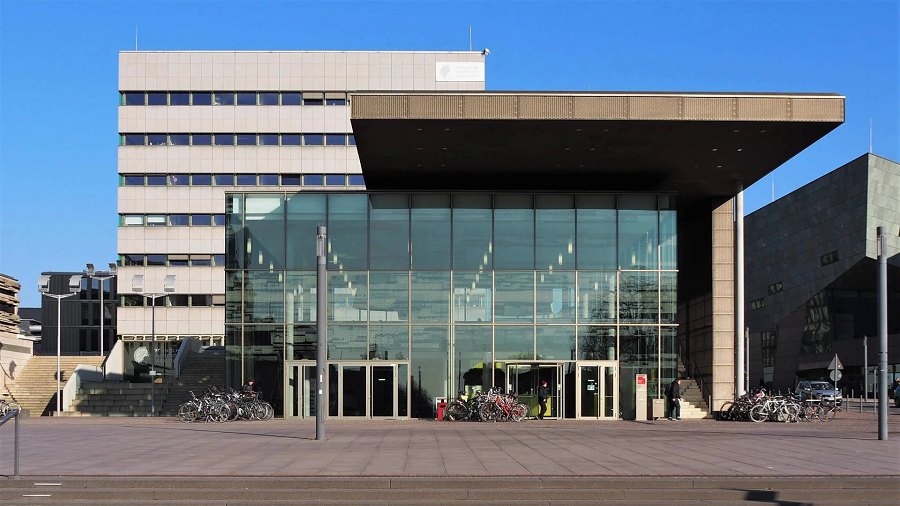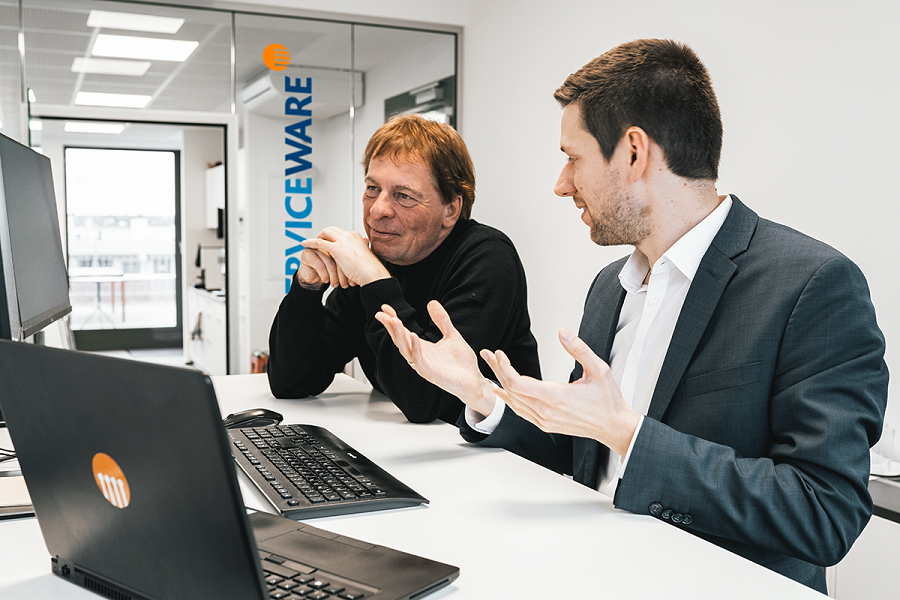Get some insights
A day at Serviceware's AI innovation lab in Darmstadt

Artificial Intelligence (“AI”) is already being used in many different products that we encounter every day: when we brush our teeth with an electric toothbrush, with speech recognition in our car – and also when we communicate with companies as service customers. After all, AI is a key technology for successful digitalization. But how are the new AI-driven applications created? The team at the Serviceware AI innovation lab in Darmstadt provides us with insights into the development.
Monday morning, 9:00 AM
Adrian Engelbrecht, Head of AI at Serviceware, begins his working day at the AI competence center close to Luisenplatz square, the city center of Darmstadt. Engelbrecht and his colleagues develop solutions in the field of Artificial Intelligence which enable users of the Serviceware platform to advance their digital initiatives. Adrian Engelbrecht’s schedule is packed with appointments this Monday. At the start of the week, several meetings and conversations – virtual and face to face – are on his agenda. Later, some of his colleagues will join him. They have started the day in their home office.
10:00 AM
Engelbrecht, who holds a degree in business information systems, joins a “sprint review” with the messaging team, the development team responsible for the chatbot components of the Serviceware platform. The participants had two weeks to work on previously jointly defined objectives. In the sprint review, the results are presented, current development at customers, challenges and upcoming tasks are discussed. Engelbrecht and his colleagues present the features, special characteristics and functions of a software which has been newly developed. Cooperation with the other development teams at Serviceware is just as much a part of the AI-specialist’s daily business as the close exchange with Serviceware customers.
“Our solutions are all oriented towards concrete challenges in the everyday life of companies. Together with customers and colleagues we analyze the points at which Artificial Intelligence can help and also stay in close contact with them during implementation,” says Engelbrecht. “The messaging team builds the framework and the basic logic into which the AI functionalities are integrated.”
12:00 PM
Yan Qu, Chris Stahlhut and Sanjaya Subedi have arrived. The working day continues in the office. Qu, Product Owner AI, is responsible for communication with stakeholders and the identification and prioritization of the goals of a development team. Together with her colleagues, Yan Qu develops Artificial Intelligence-based solutions for corporate and enterprise performance management which make planning and analysis processes simpler and more efficient. “At the end of 2021, we developed a self-service with which our customers can now train various machine learning models and apply results directly. In this early stage of development, we are in close contact with the first customers and take their feedback into account for further developments.”
Chris Stahlhut arrives, pleased to join his colleagues in person. The atmosphere is relaxed. “Working with my colleagues is varied. We understand each other intuitively.” Stahlhut currently combines several roles in his person: Development Lead, Software Developer and Data Scientist. “Our customers often face challenges that can be addressed well with AI,” the expert explains. “Where companies have collected a lot of data in recent years, Serviceware has potential to deploy solutions with AI.”
Stahlhut is currently busy with model development. Later he will discuss it again with his colleagues. “We define the deployment strategy, semi- or fully automated processes for installation and configuration of software, the structure of the services, monitoring and model development. The customer gets everything from us from a single source.”
2:00 PM
Sanjaya Subedi had his daily stand-up meeting with the team of Serviceware Knowledge. Usually, these meetings last just a few minutes. The AI teams of the respective modules provide each other with a brief update on current developments and plannings for the coming days. “In this way we obtain a good overview of what is currently happening on the level of our colleagues.” Subedi is one of the “old hands” at the AI competence center. He has been on board since the centre was set up in 2019 and had already been involved in the development of three AI-supported assistants for a more efficient service management. “At present we are working on solutions with which companies can offer their customers improved self-services. This includes, for instance, interfaces to identify the intention of users on websites or in apps at an early stage and offer solutions.”
3:00 PM
Pair programming by Adrian Engelbrecht and Chris Stahlhut. With this working technique, they develop source code at one workplace. Engelbrecht and Stahlhut take turns writing code, while the other monitors the process and provides feedback. “Four eyes see more than two,” says Stahlhut. “The system has fully established itself here,” adds Engelbrecht.
4:30 PM
Sanjaya Subedi gets a visit from two students from the Business Information Systems course of studies of the Technical University Darmstadt. The two are doing their IT internship at Serviceware. Serviceware acts as project sponsor and the students develop software for Serviceware during their internship. The cooperation with the Technical University Darmstadt is close and trusting. “I studied there, as did Chris, Yan and Adrian. That’s why we can put ourselves in the students’ shoes and know what is important in their tasks.” The two students are accompanied by Professor Dr. Peter Buxmann. Together with Adrian Engelbrecht, the university professor for business information system and AI-expert is evaluating further possible uses for AI and Machine Learning and enquires about the current development in the individual AI teams for Serviceware modules. The extensive cooperation and joint research continues to result in integrated AI products that augment the Serviceware ESM platform.
